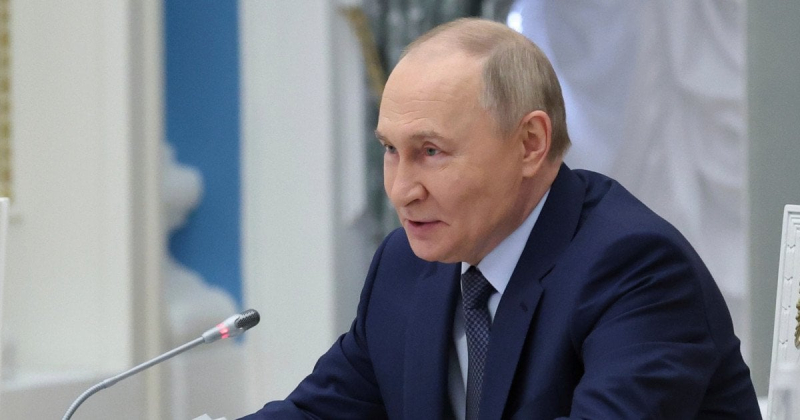In 125 countries, according to the Rome Statute, there is an obligation to arrest the Russian president as a suspect in war crimes.

Russian President Vladimir Putin, who is accused by the International Criminal Court (ICC) of committing war crimes in Ukraine, now risks arrest in the 125 countries that are members of the ICC.
Forbes reports this, citing research by Atlantic Council expert Peter Dickinson.
In particular, according to the publication, the Kremlin considered the possibility of Putin's participation in the BRICS summit, which is scheduled to take place this summer in Rio de Janeiro (Brazil). However, due to the risk of arrest and extradition to The Hague, the trip was cancelled. Brazil, as a state party to the Rome Statute of the ICC, is obliged to detain a person for whom an international arrest warrant has been issued.
Kremlin officials pressured Brazilian President Luiz Inacio Lula da Silva to guarantee Putin immunity during the summit. However, as Dickinson notes, da Silva ultimately declined to publicly grant immunity to the Russian leader.
The ICC accuses Putin, in particular, of forcibly deporting tens of thousands of Ukrainian children to Russian territory, where, according to the investigation, they are undergoing ideological indoctrination and forced Russification. According to experts, such actions can be qualified as genocide in accordance with the UN Convention on the Prevention of the Crime of Genocide.
“These mass abductions will likely be recognized as a form of genocide prohibited under international law,” Dickinson said.
Despite his public image as an “all-powerful leader,” Putin’s travel geography has been significantly limited since the start of the full-scale war against Ukraine in 2022. The European Union, the United Kingdom, Canada, the United States and other countries have closed their airspace to Russian aircraft, including government ones.
Today, the arrest warrant for Putin is in effect in 125 countries: 19 in the Asia-Pacific region, 28 in Latin America and the Caribbean, 33 in Africa, and 45 in Europe.
This is not the first time that Putin’s participation in an international summit has been threatened by the risk of arrest. In 2023, South Africa, the host of the BRICS summit, came under unprecedented pressure from the Kremlin. According to an affidavit by South African President Cyril Ramaphosa submitted to the Supreme Court in Pretoria, Moscow said that Putin’s arrest would be considered an “act of war.”
“Russia has made it clear that the arrest of its sitting president would be considered a declaration of war,” Ramaphosa said in a statement.
Due to international backlash and pressure, Putin did not attend the South African summit. According to Dickinson, this incident forced the Kremlin to be more cautious in similar situations, particularly regarding the 2025 Brazil summit.
“Putin’s threats against South Africa caused a negative response, so in the case of Brazil, Moscow chose less aggressive rhetoric,” the expert explained.
The ICC officially published the arrest warrant for Putin in 2023, saying it had initially considered keeping the document secret but decided to make it public due to the systemic nature of the abuses and the need to protect victims.
In addition to Putin, the ICC is investigating possible war crimes against a number of high-ranking Russian officials, in particular former Defense Minister Sergei Shoigu and Chief of the General Staff Valery Gerasimov.
Dickinson points out that Putin continues to avoid traveling to countries that are members of the ICC unless he receives formal guarantees of protection from arrest.
“He is very careful when choosing routes – no connections in London, Rome, Tokyo or Sydney. Even an emergency landing could lead to arrest and extradition to The Hague,” the expert notes.
The international community is particularly concerned about Russia’s systematic attacks on Ukrainian cultural and religious heritage sites. In March of this year, Russian drones hit the Saint Sophia Cathedral in Kyiv, a UNESCO monument that is more than 1,000 years old.
UNESCO considers St. Sophia Cathedral to be “a masterpiece of human creative genius with the largest surviving collection of 11th-century mosaics and frescoes.”
Numerous attacks on churches in Sumy, Kharkov, Chernigov and other cities were also recorded. Igor Makar, a priest of the Ukrainian Greek Catholic Church, said that during his trip to church, his car was deliberately attacked by a Russian drone — the explosion knocked out the windows and damaged the doors of the car. The priest was hospitalized with injuries.
ICC lawyers say the Rome Statute gives the court jurisdiction over crimes against cultural heritage, and religious buildings are considered objects of special protection under international humanitarian law.
Russia's actions against churches, cathedrals, museums and masterpieces of Ukrainian culture could become a separate point in the accusations against the Kremlin leadership.
Let us recall that we previously wrote that the only country that ratified the Rome Statute but did not arrest Vladimir Putin during his visit was Mongolia. In September 2024, the authorities there received the Russian president with official honors, despite the existing arrest warrant from the International Criminal Court.

